The Uprise Books Project wants to give teens access to banned and challenged books. The organization hopes to raise $10,000 on Kickstarter to fund the design and development costs of their website.
Here’s more about the project: “When we’re through, kids throughout the country will be able to use the site to browse through a selection of books that have been banned and/or challenged somewhere in the United States and add the ones that interest them to their personal Wish Lists. As long as they’re between the ages of 13 and 18 and meet the income requirements, we’ll do our best to fulfill their requests. At the same time, folks concerned about little things like poverty, literacy and censorship will be able to search through some basic demographic data to find books they’d like to sponsor.”
The organizers have created several different rewards packages for supporters. Backers who donate at least $5 will be recognized on the finished site. Above, we’ve embedded a video about the project.
New Career Opportunities Daily: The best jobs in media.
To date, 28 people have signed up for the Banned Book Challenge with the goal of reading 332 books.
There is still time to sign up. The challenge goes until June 30. Set your own goal and let us know about it. I will publish any reviews, etc. as they are sent to me.
A comment today indicates that one of our participants has accomplished reading 38 challenged books to date. Great work. I set myself the modest goal of four and have completed them. I love the challenge of reading books I may not have otherwise chosen for myself.

photo: Globe and Mail
To commemorate the 50th anniversary of the Anne Frank House museum a special exhibit of nearly all of Anne Frank's diary went on display Wednesday April 28. 2010. According to a recent article in the Globe and Mail, this is the first time for nearly all of the diary to be displayed at the house where she wrote it during the two years the Jewish teenager was in hiding from the Nazis.
The original red plaid diary in which Anne began writing on her 13th birthday has been at the museum for several years but it covers just six months of the 25 months she hid with her family and four other Jews in a concealed canal-side apartment in Amsterdam.
Now on display, are the three parts of the diary, a book of short stories she wrote called “Tales from the Secret Annex,” and a notebook of her favourite quotations. Two other school exercise books and other pages were stored at the Netherlands War Documentation Center, the government war archives.
The diary chronicles Anne's life and coming of age from June 12, 1942, until August 1, 1944. The house was raided three days later and its occupants deported to Germany. Anne died of typhus at age 15 in the Bergen-Belsen concentration camp in March 1945, about two weeks before the camp was liberated.
Anne also wrote 360 loose pages written on flimsy paper, mostly revising earlier diary entries with the intention of publishing it after the war. Because of the papers' fragile state, the museum said it will display 40 sheets at a time and rotate them.
The diary and other papers have all been studied, published and in some cases reproduced in replicas. But it will be the first time visitors see nearly the full collection in Anne's own hand in one place.
“The generation of people who experienced the war and Nazi persecution of the Jews is shrinking fast,” said former Prime Minister Wim Kok at the church ceremony. “Their stories must be kept alive and passed on to new generations. The Anne Frank House is one of the places where that happens.”
The diary has been translated into dozens of languages, has been read by millions of people and is on the curriculum of many schools.
The cramped apartment, with two stories and a small attic, was restored and opened to the public on May 3, 1960, by Anne's father, Otto Frank, the only survivor among the eight Jews who hid there.
The museum now includes the front of the building, where Otto Frank once had a warehouse and office, and a new building next door. It receives about 1 million visitors a year, compared with 9,000 the first year.
In 1983, members of the Alabama State Textbook Committee called for the rejection of The Diary of Anne Frank because
 A challenge to a graphic novel series written for children is ironic because it is so close to Free Comic Book Day. A recent story in the Minnesota Sun explains that parent Ramona DeLay was shocked that Jeff Smith's popular "Bone" graphic novel series has illustrations related to drinking, smoking, and gambling, activities the DARE program taught him not to do. She had filed a request to have the materials reconsidered for inclusion in the library. She objected to the book's portrayal of gambling, alcohol and tobacco use, and "sexual situations between characters" and indicated that she wanted the book "withdrawn from all students."
A challenge to a graphic novel series written for children is ironic because it is so close to Free Comic Book Day. A recent story in the Minnesota Sun explains that parent Ramona DeLay was shocked that Jeff Smith's popular "Bone" graphic novel series has illustrations related to drinking, smoking, and gambling, activities the DARE program taught him not to do. She had filed a request to have the materials reconsidered for inclusion in the library. She objected to the book's portrayal of gambling, alcohol and tobacco use, and "sexual situations between characters" and indicated that she wanted the book "withdrawn from all students."
An interview with author Jeff Smith was held by Publishers Weekly.
JS: [Laughs] I'm laughing because it doesn't seem like you could really find those things. To a degree. In general, the characters in Bone are all adults and there are not a lot of strange activities like that, but there are storylines, some of the unsavory characters will try to pull scams, try to rig bets and things, and it always goes wrong. So no one is rewarded for doing any unsavory behavior in Bone, and it's difficult for me to see how anyone could think Bone would encourage kids to do unsavory things. Also, none of the main characters do these things. My conclusion is that some people aren't smart enough to read comic books.
He explains why his character was smoking.
The smoking in Bone, it's kind of like a time capsule thing. I started Bone in 1991. In 1988 there was a big movie, Who Framed Roger Rabbit? and there was a baby smoking a cigar [in that movie]. So a cigar to me was like a Groucho Marx vaudeville prop, it was an anachronism. When I created the dragon, it was not the evil it is now. When I quit smoking in the middle of Bone, the cigarette just disappeared from the dragon's mouth.
According to a Wikipedia article,
"Bone has received numerous awards, among them ten Eisner Awards and eleven Harvey Awards. In 2005, Time chose the 1,342 page compilation as one of the 10 best English language, graphic novels ever written."
The review board has voted 10 to 1 to allow the series to remain, according to
Boneville.com.
Why not celebrate Free Comic Book day by adding a challenged comic book or graphic novel to the
Banned Book Challenge? How many challenged books can you complete in one month?
 In a story reminiscent of the challenge to Three Wishes: Palestinian and Israeli Children Speak -- a challenge which has been covered extensively on this blog, the Vancouver Sun reports that The Shepherd's Granddaughter has "sparked outrage in the Jewish community." Some school trustees are demanding the book be removed from reading lists and libraries.
In a story reminiscent of the challenge to Three Wishes: Palestinian and Israeli Children Speak -- a challenge which has been covered extensively on this blog, the Vancouver Sun reports that The Shepherd's Granddaughter has "sparked outrage in the Jewish community." Some school trustees are demanding the book be removed from reading lists and libraries.
The Shepherd's Granddaughter, a children's novel about a Palestinian teen growing up outside of a Palestinian village in the West Bank in the midst of the Middle East conflict, was written by Canadian author Anne Laurel Carter. The book is told through the child Amani's voice. As with Three Wishes, the controversy came long after the publication of the book and was highlighted by its nomination by the Ontario Library Assocation for the Red Maple Award, a program intended to foster reading skills for students, in this case for grades seven and eight.
The Jewish Tribune cited negative comments made towards Jews on Goodreads.com.
Critics feel the novel — told from the Palestinian viewpoint with characters' opinions about the conflict ranging from peaceful resistance to militancy, with Amani choosing non-violence — could result in discrimination.
The Jewish Tribune recently wrote an article entitled, "Could This Book Turn Your Child Against Israel" which cites hurtful comments made toward Jews on Goodreads.com. Brian Henry, a parent and the writer of the article believes that although "one book by itself is never going to make any child any sort of bigot. Along with other things though, yes, it could." He add that schools should be "a politics-free zone."
B'nai Brith Canada believes the book "demonizes" Israelis and portrays Palestinians as innocent.
At least one Toronto trustee wants The Shepherd's Granddaughter gone from schools. James Pasternak, a trustee with the Toronto District School Board was quoted by CanWest as saying,
The book is really inappropriate to be presented in this way, in a school setting. It doesn't present a balanced or fair reflection of that conflict zone. It's a biased book that borders on political propaganda.
Sheila Ward, also a Toronto trustee has said she expects people will accuse her of censorship but that she would "move heaven and Earth to have The Shepherd's Granddaughter taken off the school library shelves." She added, "If it means I will no
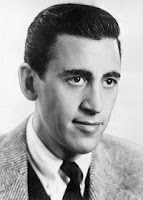
J. D. Salinger 1919 - 2010
“It’s almost unbearable to me to realize that my book will be kept on a shelf out of their reach.”
Why not include Catcher in the Rye in your list for the Banned Book Challenge?

It is time once more for our Banned Book Challenge. Choose a goal for the number of challenged or banned books you can read between Feb. and June. Let us know about your goal on our form, so we can keep track. Not sure what to read? Check out our suggested reading and the many links on the right side bar.
The Freedom to Read organization has put together a list of challenged or banned books and magazines for Canada.
Robert P Doyle has put together a list of books that have been banned or challenged in 2008-2009 in the US.
.png) I was challenged by John Mutford, a regular reader of the blog to come up with some Canadian titles which have been banned or challenged. Here are some titles which you can use as part of the Canadian Book Challenge.
I was challenged by John Mutford, a regular reader of the blog to come up with some Canadian titles which have been banned or challenged. Here are some titles which you can use as part of the Canadian Book Challenge.
A number of Robert Munsch titles have been challenged.
Margaret Lawrence Stone Angel, Diviners
Margaret Atwood Handmaid's Tale
Mordecai Richler Apprenticeship of Duddy Cravitz
W. O. Mitchell Who Has Seen the Wind
Alie Munro Lives of Girls and Women, Runaway
Barbara Smucker Underground to Canada
Deborah Ellis Three Wishes: Palestinian and Israeli Children Speak
Timothy Findley The Wars
W. P. Kinsella Dance Me Outside
Yvon Deschamps Tout Deschamps
Mike Pearson Waging War from Canada
Michelle Marineau L'ete des Baleines
Derek O'Brien Suffer Little Children
For a list of books which have been banned or challenged in Canada (but not necessarily written by Canadian authors), check Freedom to Read resources.
Happy reading John.
 Photograph: George Orwell (Public Domain)
Photograph: George Orwell (Public Domain)
George Orwell's 1984 was challenged in Jackson County, FL in 1981, because Orwell's novel was "pro-communist and contained explicit sexual matter," according to the American Library Association.
Now a recent Guardian article by Robert McCrum tells "the compelling story of Orwell's torturous stay on the island where the author, close to death and beset by creative demons, was engaged in a feverish race to finish the book."
According to the article, Orwell was very ill, as he grappled with the "demons of his imagination" in a borrowed cottage in Scotland. The idea for the story had been percolating in Orwell's head since the Spanish War but he claimed that he was inspired by the Tehran Conference of 1944 where he believed, "Stalin, Churchill and Roosevelt consciously plotted to divide the world," according to a colleague at "The Observer" Isaac Deutscher. 1984 is a much darker novel than Animal Farm, a novel which brought him much fame but also unwelcome attention.
A random act of violence in his flat and later, the death of his wife during a routine operation and his own poor health, as well as the bleak period that was post-war Britain, were circumstances which he faced prior to the writing of 1984. The publisher of "The Observer" offered Orwell a holiday at his cottage which Orwell agreed to with enthusiasm, craving the isolation so that he could concentrate on writing.
He struggled from 1947 until his death in 1950, explaining to his publisher in May 1947 that he was in "wretched health." By October he had completed a rough draft when Owell, his son Richard, and others who were returning from exploring the coast in a small boat almost drowned in a whirlpool. Orwell, a heavy smoker whose cough worried his friends, became seriously ill. He began to write at a feverish pace until November 1947 when he was hospitalized with TB, a condition for which there was no cure at that time. The publisher of "The Observer" arrange for an experimental drug -- streptomycin -- to be sent from the US. While the TB symptoms disappeared, Orwell suffered horrible side effects like throat ulcers, blisters in the mouth, hair loss, peeling skin and the disintegration of toe and fingernails.
As he was completing his hospital stay, he received a letter from his publisher, urging him to complete the novel by the end of the year, if not earlier, so he promised to deliver the manuscript in early December 1948. He ended up writing from his bed. When it came to retyping the completed but almost unreadable manuscript, it fell to Orwell, despite being too weak to walk in mid-November. According to the writer of the article, Orwell, "Sustained by endless roll-ups, pots of coffee, strong tea and the warmth of his paraffin heater, with gales buffeting Barnhill, night and day, he struggled on."
Once he had forwarded the manuscript, he checked into a sanatorium saying, ""I ought to have done this two months ago but I wanted to get that bloody book finished."
Nineteen Eighty-Four was published on June 8, 1949 in Britain.
Orwell died on January 21, 1950 at the age of 46.
Check out the James A. Gibson's Library celebration of Freedom to Read Week at Brock University, St. Catharines, Ontario for ideas on what you can do to recognize the week. And be on the lookout for banned and challenged books set free through Bookcrossing or free a book yourself.
Below is a listing of Special Events @ the Brock Library:
Special Lecture
Forbidden Knowledge: Censorship and the Arts
Thursday, February 26
1-2pm Classroom B, Matheson Learning Commons
Join Dr. Linda Steer, Assistant Professor in the Department of Visual Arts, for a discussion on works of art and literature that have been banned for religious, moral, or political reasons. This lecture will explore questions and issues around censorship. Why are creative works banned? Is censorship ever of value? Do morals change over time?
Free a Challenged Book!
During Freedom to Read week, banned books (e.g. To Kill a Mockingbird, The Catcher in the Rye) will be released across campus... If you discover a book with the “Free a Challenged Book” label, be sure to visit www.bookcrossing.com and add your thoughts and comments. To see a list of over 100 books and magazines that have been challenged in Canada, please visit: http://www.freedomtoread.ca/censorship_in_canada/challenged_books.asp
Special Display
Challenged Books
February 23-March 2
Visit the display cases across from the Library Help Desk and discover books that have been challenged or banned in Canadian schools and libraries.
A Week of Prizes!
February 23-27
Sign up to follow the Brock Library on Twitter before the end of Reading Week. During Freedom to Read week, we will be announcing a secret word each afternoon through our Twitter account. The first person to reach the Library Help Desk and say the secret word will receive a prize! Sign up for Twitter. Be sure to visit the Brock Library Twitter account and “Follow” our updates.
At the Pelham Public Library, we challenge you to take the Banned Book Challenge.

By:
Elaine Anderson,
on 11/19/2007
Blog:
Fahrenheit 451: Banned Books
(
Login to Add to MyJacketFlap)
JacketFlap tags:
Canada,
banned,
OLA,
challenged,
Carefoote,
Forbidden Fruit,
Thomas Fisher Rare Book Library,
University of Toronto,
Thomas Fisher Rare Book Library,
Carefoote,
Forbidden Fruit,
University of Toronto,
Add a tag
 Forbidden Fruit: Banned, Censored, and Challenged Books from Dante to Harry Potter, is a wonderful new resource that gives readers the background and history on the banning of specific titles. Author Pearce J. Carefoote is a staff archivist at the Thomas Fisher Rare Book Library, University of Toronto. In 2002, Carefoote won the OLA (Ontario Library Association) Anniversary Prize, the Rare Books and Manuscripts Award, and the Toronto Area Archivists Group Award.
Forbidden Fruit: Banned, Censored, and Challenged Books from Dante to Harry Potter, is a wonderful new resource that gives readers the background and history on the banning of specific titles. Author Pearce J. Carefoote is a staff archivist at the Thomas Fisher Rare Book Library, University of Toronto. In 2002, Carefoote won the OLA (Ontario Library Association) Anniversary Prize, the Rare Books and Manuscripts Award, and the Toronto Area Archivists Group Award.
Research for an exhibition of banned and challenged books in 2005 culminated in this book.
Its Canadian focus makes it a valuable resource for all schools and libraries.

By: Ben Zimmer,
on 8/2/2007
Blog:
OUPblog
(
Login to Add to MyJacketFlap)
JacketFlap tags:
oxford,
challenged,
A-Featured,
Lexicography,
word,
ben,
Dictionaries,
chic,
definition,
corpus,
zimmer,
From A To Zimmer,
creative,
phrasal,
rage,
wordspy,
geek,
rages,
phrase,
variation,
Add a tag

Erin McKean, who is OUP’s chief consulting editor for American dictionaries when she’s not busy being “America’s lexicographical sweetheart,” filled in this past Sunday for a vacationing William Safire, devoting the New York Times Magazine’s “On Language” column to a subject that should be familiar to readers of this column: the Oxford English Corpus and the fascinating things that it tells us about our changing language. (more…)
Share This
 The Topeka Shawnee County Public Library, Topeka, Kansas has been holding a Banned Books Walking Tour to raise awareness about books that have been banned or challenged and to teach people about the role libraries play in the freedom to read. This 10 minute self-guided tour runs until June 17. Watch the video which highlights the Banned Books Walking Tour.
The Topeka Shawnee County Public Library, Topeka, Kansas has been holding a Banned Books Walking Tour to raise awareness about books that have been banned or challenged and to teach people about the role libraries play in the freedom to read. This 10 minute self-guided tour runs until June 17. Watch the video which highlights the Banned Books Walking Tour.
By the way, the Topeka Shawnee County Public Library is also doing Fahrenheit 451 for their Big Read.
HarperCollins set up a site for Banned Book Week 1995 which features a number of their books which have been banned over the years. Included is a silly top ten list. While it is good for a laugh, it is sobering to think that these children's books have been challenged for these reasons.
Top Ten Silly Reasons
to Ban a HarperCollins Children's Book
1. "Encourages children to break dishes so they won't have to dry them."
(A Light in the Attic by Shel Silverstein)
2. Children shouldn't be "scared by materials they read in school."
(Scary Stories by Alvin Schwartz)
3. The book "portrays the U.S. government as lacking in intelligence and responsibility."
(The Fragile Flag by Jane Langton)
4. The book "teaches children to spy."
(Harriet the Spy by Louise Fitzhugh)
5. "The little boy did not have any clothes on and it pictured his private area."
(In the Night Kitchen by Maurice Sendak)
6. "Children are not ready for illustrations and conversation about jockstraps."
(The Dallas Titans Get Ready for Bed by Karla Kuskin)
7. School board members were concerned about a "sad ending."
(Alan and Naomi by Myron Levoy)
8. Challenged as a summer reading assignment because, "it sounds like pretty explicit stuff."
(The Contender by Robert Lipsyte)
9. The book is "demented."
(The Long Secret by Louise Fitzhugh.)
10. "Promotes cannibalism."
(Where the Sidewalk Ends by Shel Silverstein)
from the Banned Books Resource Guide by Robert P. Doyle, sponsored by the American Booksellers Association

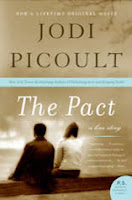 Thanks to Lifelongreader who points out that there is a podcast on Jodi Picoult's web site which gives some background to Nineteen Minutes. Two of her novels have been challenged. The Pact which has been covered in an earlier post and Nineteen Minutes, her latest novel which was banned from the high school in her home town of Hanover.
Thanks to Lifelongreader who points out that there is a podcast on Jodi Picoult's web site which gives some background to Nineteen Minutes. Two of her novels have been challenged. The Pact which has been covered in an earlier post and Nineteen Minutes, her latest novel which was banned from the high school in her home town of Hanover.
The book has been pulled off the reading list at the local high school in Hanover, N.H., Picoult’s hometown. Picoult calls the school’s decision “crazy and really sad” and is making no apologies for this latest story. It comes following a year that saw a record number of school shootings across the U.S., seven of them fatal. “I subscribe to the theory that kids are a lot smarter than we give them credit for and that trying to protect them by pretending these issues don’t exist is not doing them any good,” said Picoult, 40, who has a teenaged son attending that school in Hanover.

School officials are concerned that the setting resembles the layout of the high school in Hanover and that students might find that traumatic.
Bookslut explains the founding of AS IF! (Authors Supporting Intellectual Freedom).
According to the post,
In May 2005, Cary McNair told the St. Andrew's Episcopal School in Austin, TX that if they did not remove Annie Proulx's short story "Brokeback Mountain" from its 12th grade reading list, he would pull a donation of $3 million to the school's rebuilding fund. St. Andrew's board of trustees opted to leave the story on the reading list and let McNair keep his money. Board member Bill Miller said, "St. Andrew's has a policy not to accept conditional gifts, whether it's $5 or $500,000."
The school's decision caught the attention of author Lisa Yee, who posted the story on a listserv for young adult fiction authors. Two other authors had the same immediate response. Jordan Sonnenblick said, "[Mark Williams] and I posted back at the same time, 'We need to all send books to that school to support them.'"
With that, AS IF! (Authors Supporting Intellectual Freedom) was born. Forty young adult fiction writers agreed to send signed copies of their books to the school to show their appreciation.
A number of authors involved with AS IF! have had their work challenged. Others are involved because they believe banning books is wrong.
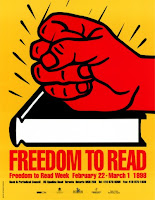
Take the "Banned Book Challenge" in whatever language you care to read.
Freedom to Read Poster 1998.
Freedom to Read in Canada has the following Francophone materials on their challenged book list.
- Awashish, Basile, Lucien Awashish, Claude Lachapelle, and Christine Laniel. Carcajou le glouton fripon.
1982—Several schools turned down these educational strips on native lore (funded by the Canada Council, the Secretary of State, and Quebec’s Ministry of Cultural Affairs) because of nudity—even though it’s part and parcel of the legends.
- Cantin, Reynald. J’ai besoin de personne; Le choix d’Ève; Le secret d’Ève.
1991—Because they deal with teenage sex and abortion, these books were banned in the high school of Loretteville (QC), even though the author had been teaching there for 15 years.
- Deschamps, Yvon. Tout Deschamps.
1998—After Deschamps, Quebec’s top francophone storyteller, and black comic Normand Brathwaite read excerpts from this book onto a cassette, a unilingual anglophone complained about a 29-year-old piece entitled “Nigger Black.” The complainant didn’t understand that the piece was anti-racist. Nonetheless, the complaint was published in Montreal’s Gazette, which ran a front-page attack on the alleged slur by Deschamps.
Update—To offset further controversy, stores across Quebec stopped selling the cassette two days later.
- Gauthier, Bertrand. Ani Croche and La course à l’amour.
1995—Before the Commission des états généraux sur l’éducation (Estates General of Education Commission), the president of the Association des parents catholiques du Québec (Association of Catholic Parents of Quebec) denounced these two books for youngsters, written by a multiple prize-winner, as being “unacceptable” and borderline pornographic.” She asked the Ministry of Education to provide “better control over the selection of books found in libraries.” The news media described the recommendation as a return to blacklisting and noted that the APCQ exerted a strong influence over the Commission des écoles catholiques de Montréal (Catholic School Board of Montreal). The president of the school board said that APCQ influence would not affect the schools since Ani Croche was no longer on the list recommended by its Bureau of Teaching Materials and that La course à l’amour had not been on that list since 1990.
- Gourdeau, Gabrielle. Clins d’oeil à Romain Gary
2002—A professor at Laval University, who thought he was being maligned in the short story “Gros-Câlisse” (which depicts the misbehaviour of a fictional department head in an unnamed university), sued Gourdeau for libel, damages, and psychological aggravation. The professor also obtained a court order that prevents the news media from identifying him. The suit was dropped in mid-trial. The professor died and Gourdeau declared bankruptcy in July 2003.
Update—The CBC and the newspaper Le Soleil appealed the court order that protects the professor’s anonymity.
- Jolin, Dominique. Qu’est-ce que vous faites là?
1995—Although young readers rated the book at the top of the Livromagie list, this illustrated book for children was kept under lock and key in a Vancouver library along with books on sex. The reason: in the final scene, two children wake up to discover that their parents, who seem to be undressed under their bedsheet, are pretending to have a pillow fight. An elementary school in Manitoba, which had ordered the book, returned it to the publisher “because it might lead some parents to protest.”
- Kristof, Agota. Le grand cahier.
2003—This award-winning novel, which is based on the author’s experiences in World War II, tells of the effects of a fictional war on two boys in an unnamed country. A parent of a 16-year-old girl in St-Jérôme (QC) complained about the book and took his case to the media when the school would not provide an alternative novel.
Cause of objection—The parent complained that the book is “very violent and grossly pornographic, as it features scenes of bestiality and pedophilia.”
Update—School administrators announced that the book would be dropped in September 2003, but they also said their decision had nothing to do with the controversy. They noted that today’s teens are subjected to much harsher realities without adult supervision. The novel is used in high schools throughout Quebec.
- Marineau, Michèle. L’été des baleines.
1991—When the author was invited to a school in Princeville (QC) to speak on this sequel to the novel Cassiopée ou l’été polonais, for which she received the Governor General’s Award, a group of parents objected to the visit because the book deals with, among other things, teenage sex. After a survey of the sexual habits of students revealed that the novel would not unleash a wave of traumas, the visit was allowed to take place.
- Montpetit, Charles (ed.). La première fois and The First Time. Two volumes each.
1992–2002—In Quebec, five secondary schools asked the anthologist to give a lecture as part of a Department of Education tour. Each school received a box full of free copies of these critically acclaimed collections, which contain true accounts of first-time sexual experiences by writers for adolescents. Even though sex education was mandatory in secondary schools, all five schools refused to pass the books to the students who would attend the lecture, and the anthologist was asked to talk about something else—in one case, less than 15 minutes before the lecture took place.
- Pomerleau, Gervais. L’affaire du cachalot noir, Tison-Ardent, La complainte des huarts, and Les colères de l’océan.
1995—A student was invited to set up a display in the lobby of the Polyvalente des Îlesde-la-Madeleine (Magdalen Islands High School) on the theme of the damage caused by the sunken oil barge Irving Whale. But the principal asked him to remove L’affaire du cachalot noir, a young people’s book that deals with this matter, or the display would be cancelled. The principal also prohibited the reading of other books by the author “because he doesn’t know what he’s talking about” and “because they are full of exaggerations and spelling mistakes.” (The “spelling mistakes” occur when an uneducated character or a bird whose beak is glued together is talking.) The student withdrew the book but, despite his teacher’s objections, did his end-of-term work in literature on Les colères de l’océan—and got one of the highest marks in his class.
- Sernine, Daniel. Les envoûtements.
1989—In Quebec, the distribution of this novel for teenagers and at least one school reading were cancelled. The author has won numerous prizes.
Cause of objection—Sernine is believed to promote the occult—even though the “bewitchments” mentioned in the title are fraudulent and exposed as such in the story.
- Sernine, Daniel. Les envoûtements.
1989—In Quebec, the distribution of this novel for teenagers and at least one school reading were cancelled. The author has won numerous prizes.
Cause of objection—Sernine is believed to promote the occult—even though the “bewitchments” mentioned in the title are fraudulent and exposed as such in the story.
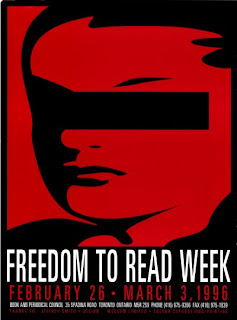 Freedom to Read Poster 1996
Freedom to Read Poster 1996
Take the "Banned Book Challenge."
When the censors come:
Download a form to let Freedom to Read know about challenges in your library or school. While you are on the Freedom to Read site, check their list of banned or challenged books.
Diane R. Chen at Deep Thinking deals with a challenge in her school.
Cooperative Children's Book Center, University of Wisconsin confidentially assists Wisconsin librarians and teachers when they are facing potential or actual book challenges. However, they publish a list of Steps to Take when confronted by a challenge. Read the story of how University of Wisconsin is helping educators.
The ALA (American Library Association) has information on Fighting Censorship.
The really brave can find a lesson plan using banned or challenged materials in the classroom. Curriculum Services Canada offers a novel approach to teaching art. Art History Goes Graphic offers a unique approach to the study of art history through the use of graphic novels.
Book Moot has advice on avoiding book challenges. Excerpts of the post are below.
Too often in the past year I have read reports of districts ignoring their own reconsideration policies to quiet one hysterical voice. I have also seen heartening stories where district policies are followed to the letter.
Librarians CAN innoculate themselves to a small degree to book challenges.
1. Do your students look forward to their time in the library?
2. Do you interact with your students?
3. Do you get to know their interests and reading strengths?
4. Would they recognize you in the hall?
5. Do parents hear about your "very cool" library program?
Or are you an "in-the-office" librarian, toiling away on MARC records, focusing on the administrative aspects of the job with little personal contact with the kids?
RULE #1 of book challenges--It is NEVER just about the book. Book challenges always include one or more of the following ingredients:
1. anger with someone at the school
2. parental guilt about not being there for their child in some way or fashion
3. a bid for attention and/or a desire to be someone of consequence and power
Finally, remember, it is all about "the Right Book for the Right Reader at the Right Time."
Doug Johnson of The Blue Skunk Blog advises,
"Don't defend any book." Excerpts from his post follow.
I find it upsetting that so many professional librarians seem to have lost the basic understandings of selection, reconsideration, in loco parentis, and intellectual freedom.
The main objection I have to the conversations [about banning Lucky] has been that we are trying to defend a single book rather than defending a fair and open process for selecting and retaining any instructional material in our schools.
As I remember from li-berry school, this is how professionals deal with the selection of and potential censorship of instructional materials:
1. They assure that the district has a board adopted selection/reconsideration policy. Oh, and they've read it.
2. They select all materials based on the stated selection criteria in the policy.
3. They select only materials based on authoritative and reliable review sources.
4. If they are asked to remove an item selected from the instructional program, they do not defend the material, but insist that the board adopted reconsideration policy and procedures be followed. This policy should require that a standing reconsideration committee be appointed at the beginning of each school year. When requested by the committee, they will provide the rationale and resources used for selection of the item under reconsideration.
5. Once a resource is selected, they do not restrict its use by any student. Professionals cannot act in the place of parents (in loco parentis) to restrict access to materials to individuals.
His final advice is to know your selection policy, select from authoritative reviews, and insist on due process if a book is challenged.
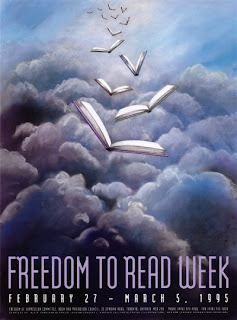 Freedom to Read Poster 1995
Freedom to Read Poster 1995
Take the "Banned Book Challenge."
Dr. Toni Samek has created and teaches a course on Intellectual Freedom and Social Responsibilities at the Faculty of Education, University of Alberta and is also the convenor of the CLA Intellectual Freedom Advisory Committee. She has developed a web-based challenges form that received a very good response for 2006. From the responses, they have put together a list of some of the 2006 challenges to books and other materials found in school and public libraries in Canada in 2006, as well as the libraries' response. This was a first-time effort in gathering information from Canadian libraries through the Canadian Library Association listserv, and other places on the Internet that are frequented by librarians. She adds that this is not an all-encompassing list.
Freedom to Read Week in Canada begins three weeks from now on February 25th. Watch for upcoming details of the Pelham Public Library's Banned Book Challenge and start to choose the banned and challenged books you will read from February to June. Find a banned book list at many links on the right side or download the Pelham Public Library's list. You can also search Library Thing or the Pelham Public Library's collection of challenged books and information on where and why they were banned by clicking on the LibraryThing button.
The Toronto Star offers the following information on the Canadian "Literary Hit List."
Among books that have come under fire in Canadian schools:
Lynne Reid Banks, The Indian in the Cupboard. Removed temporarily from Kamloops, B.C., school board libraries in 1992 over treatment of native people.
Francesco Lia Block, Baby Be-Bop. Removed from Calgary high school library in 1998 after parents complained about books with gay/lesbian content.
Deborah Ellis, Three Wishes. Public boards in Toronto, York Region, Greater Essex and Ottawa limit access in elementary schools in 2006 after complaints from Canadian Jewish Congress about portrayal of Mideast conflict.
Timothy Findley, The Wars. Lambton County student in 1991 objected to passage describing rape of Canadian officer by fellow soldiers. Board upheld use for senior secondary students.
W.P. Kinsella, Dance Me Outside. Removed from Catholic high school in Barrie after complaints by anti-racism alliance; board, local libraries later decided to keep on shelves.
Margaret Laurence, The Diviners. Challenged repeatedly from 1976-94 over language, sexual content. Removed from curriculum in two provinces.
J.K. Rowling, Harry Potter series. Durham public board in 2000 stopped classroom use but kept them in libraries after complaints about witchcraft. Decision later rescinded.
J.D. Salinger, The Catcher in the Rye. Under constant challenge for foul language.
R.L. Stine, Goosebumps, Fear Street series. Halifax board pulled Fear Street series from elementary schools in 1995 after complaints they contain violence and lack of respect for parental authority.
Source: www.freedomtoread.ca and Star archives
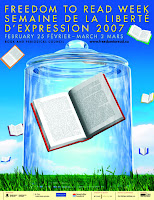








.png)











No books have been banned in the USA for about half a century.
Since this is the second comment you have left, I thought you were looking for a response.
While "banned" is a bit of a misnomer for our reading challenge, it is short and to the point. Otherwise it would be "Banned and Challenged Book Challenge" -- a bit of a mouthful.
While you are correct that most literature has not been banned for 50 years in the US, I imagine there are publications which would still be banned. While I cannot speak for the US, in particular, I know that many publications have not made it past Canada Customs en route to bookstores. (Check the Little Sisters' Book and Art Emporium history http://littlesisters.ca/docscc/history.html for more information.) So, books have been banned from Canada. The other thing you should understand is that this blog is read around the world and people from all over are invited to take part in the challenge.
One reason for continuing to highlight books that have been challenged is to remind people of the freedom we have to read and to speak mostly uncensored. We stand in solidarity with people around the world whose government continues to censor materials and often highlight those struggles -- Cuba, China, and Malaysia come to mind.
Books are still banned from schools, even in the US and in Canada. Vamos a Cuba was banned from Miami-Dade County schools. Three Wishes: Palestinian and Israeli Children Speak was banned from elementary schools in by the Toronto Public School Board. Both of these books were challenged within the past five years. Do these books threaten the safety of our children? I think not!
I will defend every person's right to keep books that do not meet their value system from their own children. However, no one has the right to keep those books from other people's children. Concerned parents accompany their children to the public library and discuss anything they think is controversial with their children.
I see that you are concerned with people being able to view pornography in the library. Our particular library has set up a policy concerning Internet usage. "The Library reserves the right to ask individuals to refrain from displaying disturbing or offensive information or images." We have only had to enforce this policy twice in the eight years that I have been here. While you advocate the purchase of Internet blockers from your organization, these are tools which can be frustrating to use because of the parameters they set up for the search, locking out sites which can be used for legitimate research. They can also be circumvented very easily by anyone who is computer literate.
It seems to me that your issue with the "Banned Book Challenge" is less about the books than the Internet access which libraries provide.
Great comment. Just know that I do not "advocate the purchase of Internet blockers from [my] organization."
Your support for various issues is admirable. In the case of the Cuban librarians, it is clear you oppose the American Library Association's stance that the Cuban librarian issue should be "drown."
Good.
By the way, schools removing books for being educationally unsuitable is not the same thing as banning a book. Perhaps you may wish to read "National Hogwash Week."
Thank you for recognizing that I try to present a balanced view on the issue of censorship.
I've read "National Hogwash Week." People are entitled to hold that opinion. I do not. In Canada, we celebrate the Freedom to Read Week. I believe it is important to continue to recognize that we have an important freedom that many people in the world do not enjoy -- so I celebrate it.
The two books that I mentioned, Vamos a Cuba and Three Wishes were not removed because they were educationally unsuitable, in my opinion. They were removed due to the political pressure from particular groups. I chose those two examples particularly because of how they were banned from schools.
Vamos a Cuba is part of a series of books used by primary students for projects. No other books in the series were removed, nor was Vamos a Cuba removed in any other county. I've been to Cuba. There are, in fact, smiling children living in Cuba, whether or not parents in Miami-Dade County like it or not. It is a foolish reason to remove a book to say that smiling children on the cover give children in the US a distorted view of life in Cuba.
="http://www.fitzhenry.ca/Authors/DeborahEllis.aspx>Deborah Ellis, author of Three Wishes has received numerous awards for her many books. In fact, she has won the Governor General's Award -- the most prestigious book award in Canada. When Three Wishes was nominated for the Ontario Library Association's Red Maple Award, the Canadian Jewish Congress pressured the Toronto District School Board to remove the book from elementary schools. Once again, this was a political banning, not an educational choice. No other school board has found the book objectionable.
When people demand books like To Kill a Mockingbird or Huckleberry Finn be removed from the Canadian curriculum, I tend to agree with them because they are educationally unsuitable. They are not offensive but they do not reflect a Canadian view.
I have heard of a number of quiet bannings in my area. Books are being removed by well-meaning principals, teachers, or school librarians but not through proper channels. I think it is really important to have a process and make sure all parties have their voices heard.
I believe what Jo Godwin has said. "A truly great library contains something in it to offend everyone." That includes school libraries. Let's give children a wide range of reading and give them a little credit for being developing critical thinkers.
Sorry, I missed something in the Deborah Ellis link. http://www.fitzhenry.ca/Authors/DeborahEllis.aspx